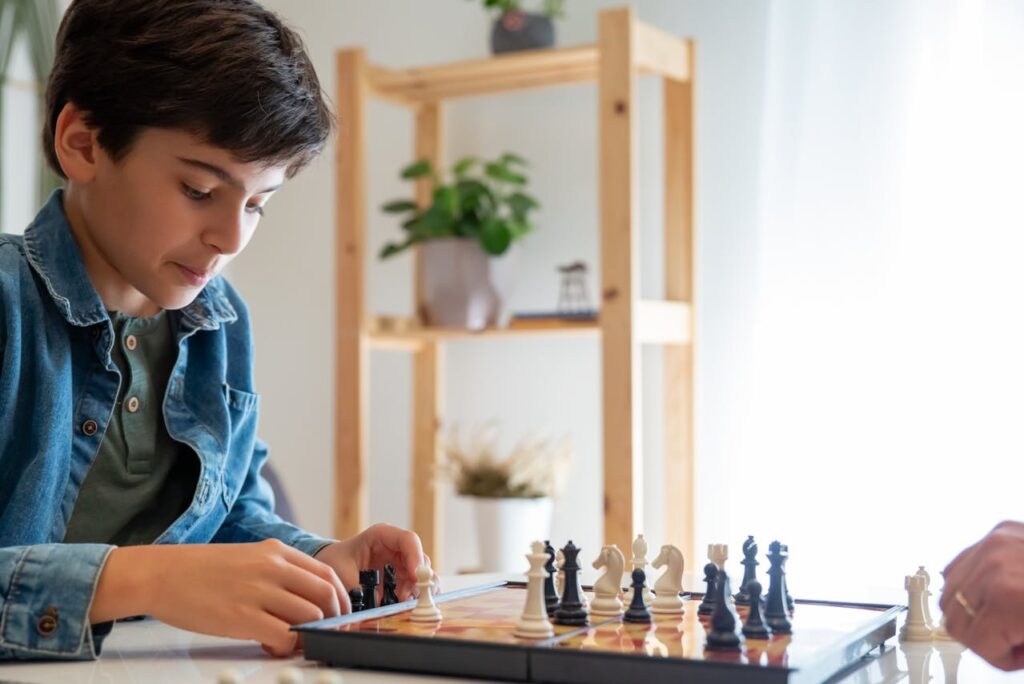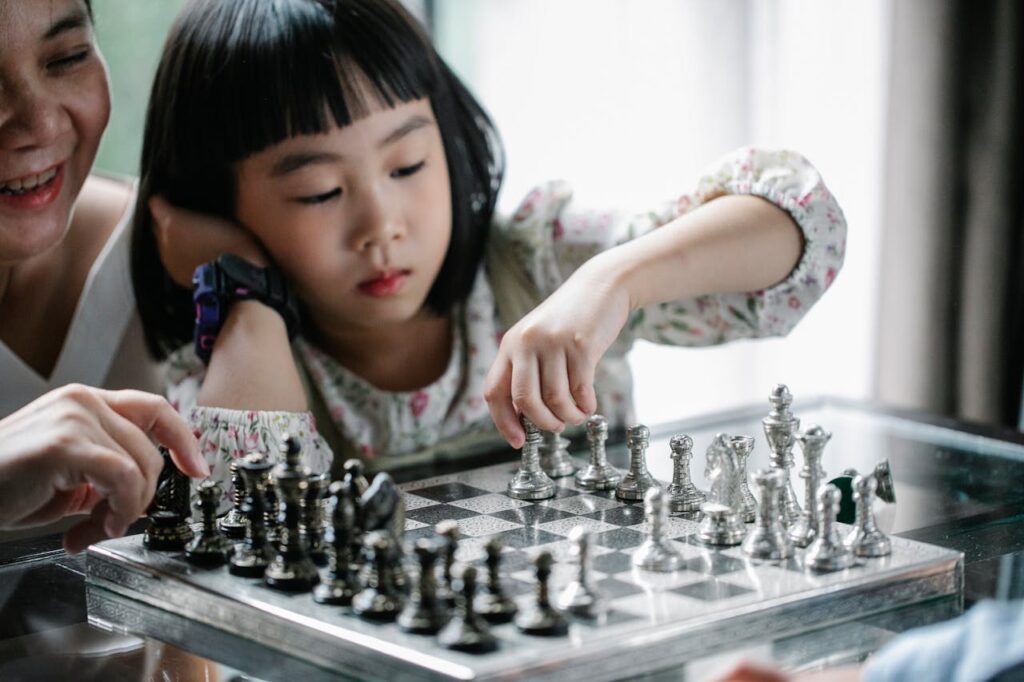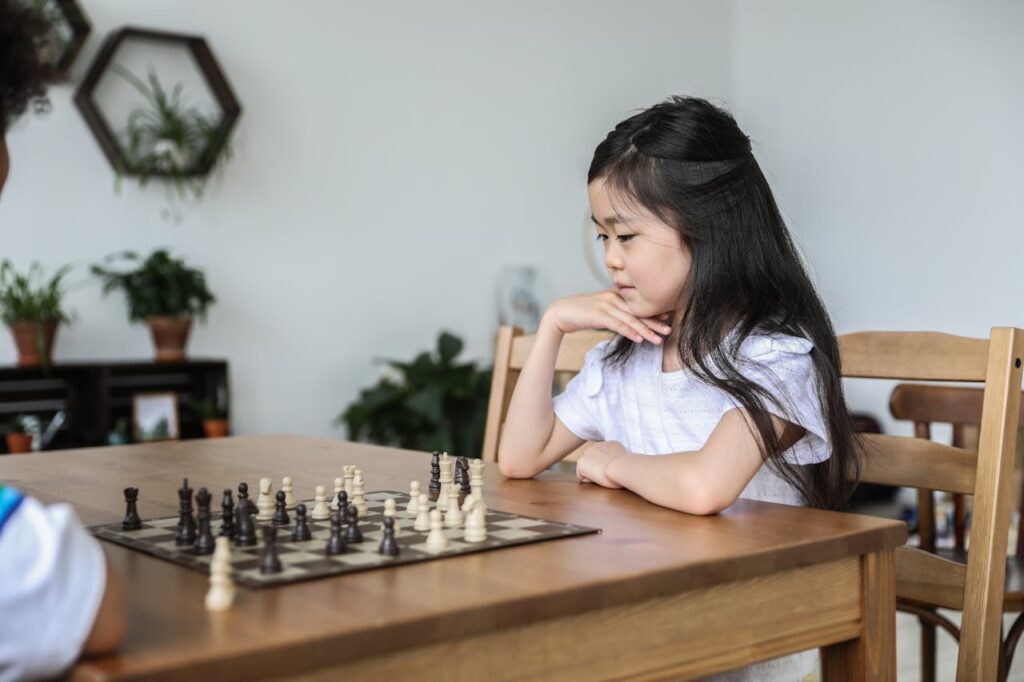Chess, often seen as a game of strategy and intellect, is much more than just a board game. It is a powerful tool for developing various skills in children, including critical thinking, problem-solving, and even emotional resilience.
However, one of the most overlooked benefits of chess is its potential to enhance social development in kids. While chess is usually played in a quiet, reflective setting, it is, at its core, a social activity that can significantly impact a child’s ability to interact with others, build relationships, and develop a sense of community.
Building Communication Skills Through Chess
While chess is often seen as a quiet game, it actually plays a significant role in developing communication skills in children.
Whether they are playing face-to-face or online, chess requires children to engage with their opponents, coaches, and peers, which helps them learn how to express themselves clearly and listen effectively.
Encouraging Verbal and Non-Verbal Communication
When children play chess, they engage in both verbal and non-verbal communication.
Verbal communication happens before and after the game—when players discuss strategies, share insights, or simply talk about the game itself.
These conversations encourage children to articulate their thoughts, explain their reasoning, and express their emotions, all of which are important components of effective communication.
For example, after a match, a child might discuss with their opponent or coach why they made a particular move or ask questions about a strategy they found challenging.
This exchange helps them build confidence in their ability to express their thoughts and ideas, enhancing their verbal communication skills.
By engaging in both verbal and non-verbal communication through chess, children learn to express themselves more effectively and understand others better.
Promoting Active Listening
Active listening is the ability to fully concentrate on what someone else is saying, understand their message, respond thoughtfully, and remember what was said.

Chess promotes active listening in several ways. During a game, children must pay close attention to their opponent’s moves and consider their implications.
This requires them to listen actively, even if the communication is non-verbal, to understand the strategy behind each move.
For example, a child playing chess needs to focus intently on their opponent’s actions, thinking about what each move means and how it affects the game.
This practice of concentrating on what someone else is doing and trying to understand their thought process builds the habit of active listening.
Fostering Constructive Feedback
Chess also teaches children how to give and receive constructive feedback.
After a game, it’s common for players to review the match together, discussing what went well and what could have been done differently.
This practice of providing and receiving feedback in a respectful and constructive manner is an essential social skill that helps children learn from their experiences and improve over time.
For example, a child might point out a clever move their opponent made or offer a suggestion for how they could have defended better.
This exchange of feedback helps both players learn and grow, and it teaches them how to give and receive criticism in a way that is helpful and encouraging.
Encouraging Sportsmanship and Respect
One of the most important social skills children can learn through chess is sportsmanship. Chess teaches children to compete in a way that is respectful and fair, regardless of the outcome of the game.
This emphasis on sportsmanship fosters a sense of respect for others, which is a fundamental component of social development.
Learning to Win and Lose Gracefully
In chess, as in life, there are winners and losers. How a child handles both outcomes can significantly impact their social development.
Chess teaches children to win with humility and lose with grace.
They learn that winning is not about belittling their opponent but about celebrating their own efforts and the process of learning that led to their success.
Similarly, losing is not a reason for despair but an opportunity to learn and improve.

For example, after winning a game, a child might shake hands with their opponent and thank them for a good match.
This simple act of acknowledging the other player’s effort teaches respect and humility.
On the other hand, after losing a game, a child might discuss the match with their opponent, asking questions and reflecting on what they could do better next time.
Promoting Fair Play and Integrity
Chess is a game that relies heavily on the principles of fair play and integrity. The rules of chess are clear, and players are expected to follow them strictly.
This emphasis on fairness and honesty helps children understand the importance of playing by the rules and respecting the integrity of the game.
For instance, in a chess tournament, children learn that it’s not just about winning, but about playing the game correctly and ethically.
They understand that cheating or bending the rules undermines the spirit of the game and that true success comes from hard work and fair play.
How Chess Builds Confidence and Social Independence
As children develop their social skills through chess, they also build a sense of confidence and social independence.
Chess challenges players to make decisions, take risks, and learn from their mistakes—all of which contribute to a stronger sense of self and the ability to interact with others confidently.
Making Independent Decisions
One of the key aspects of chess is the requirement to make independent decisions. Each move in chess is a decision that the player must make on their own, considering all the factors at play.
This constant decision-making process builds a child’s confidence in their ability to think critically and make choices independently.
For example, a child playing chess needs to decide whether to attack, defend, or sacrifice a piece based on the current state of the game.
These decisions must be made without external guidance, fostering a sense of independence and self-reliance.
Over time, as children become more confident in their decision-making abilities on the chessboard, this confidence extends to other areas of their lives.
Handling Social Interactions with Confidence
Chess also helps children develop the confidence to handle social interactions, whether they are playing a casual game with friends or competing in a tournament.
The structured environment of chess, combined with the opportunity to interact with a variety of opponents, helps children become more comfortable in social situations and build the confidence needed to engage with others effectively.
For instance, participating in a chess tournament requires children to meet and interact with new people, negotiate rules and strategies, and handle both winning and losing with grace.
These experiences teach them how to navigate social interactions with confidence, whether they are meeting someone new, working in a group, or presenting their ideas to others.
Developing Self-Discipline and Self-Control
Chess requires a great deal of self-discipline and self-control. Players must manage their time, control their emotions, and stay focused on their strategy, even when faced with unexpected challenges.
This self-discipline, developed through regular chess practice, helps children become more responsible and self-regulated individuals.
For example, during a chess game, a child might feel the urge to make an impulsive move or react emotionally to a mistake.

However, chess teaches them to pause, reflect, and think carefully before acting.
This ability to control impulses and stay focused under pressure is a form of self-discipline that is essential for success in both social and academic settings.
The Role of Chess in Creating a Sense of Community
While chess is often played individually, it also fosters a strong sense of community among players.
Chess clubs, tournaments, and online platforms bring together people who share a common interest, creating a supportive environment where children can connect with others, share their experiences, and learn from one another.
Building Relationships Through Shared Interests
Chess clubs and tournaments provide children with the opportunity to meet and connect with others who share their passion for the game.
These shared interests create a strong foundation for building relationships, as children bond over their love of chess, exchange ideas, and support each other’s growth.
For instance, in a chess club, children might meet regularly to play games, discuss strategies, and participate in tournaments.
These interactions help them form friendships based on mutual respect and shared interests, which are key components of strong, lasting relationships.
Over time, these relationships can extend beyond the chess club, providing a network of friends and mentors who support each other in various aspects of life.
Creating a Supportive Learning Environment
Chess clubs and communities also provide a supportive learning environment where children can learn from one another, share their experiences, and encourage each other’s growth.
This sense of community fosters a positive learning atmosphere, where children feel comfortable taking risks, making mistakes, and learning from their experiences.
For example, in a chess club, more experienced players might help beginners by offering tips and advice, while younger players might look up to older, more skilled members as role models.
This supportive environment encourages children to keep learning and improving, knowing that they have the support of their peers and mentors.
Fostering a Sense of Belonging
Finally, chess helps foster a sense of belonging, which is essential for social and emotional well-being.
When children participate in chess clubs, tournaments, or online platforms, they become part of a larger community that shares their interests and values.

This sense of belonging helps them feel connected to others, reduces feelings of isolation, and enhances their overall sense of well-being.
For instance, a child who feels isolated or struggles to connect with others in school might find a sense of belonging in a chess club, where they can connect with others who share their passion for the game.
This connection helps them feel more accepted and valued, boosting their self-esteem and overall happiness.
Practical Ways to Incorporate Chess into Your Child’s Social Development
As we’ve explored, chess can be a powerful tool for helping children develop essential social skills. However, incorporating chess into your child’s routine in a way that maximizes these benefits requires some thought and planning.
Start with Family Chess Nights
One of the easiest ways to introduce your child to chess and its social benefits is by organizing regular family chess nights.
This is not just an opportunity to teach your child the rules of the game, but also to spend quality time together as a family.
Playing chess together fosters communication, patience, and sportsmanship in a relaxed and supportive environment.
For example, during a family chess night, parents can model good sportsmanship by showing how to win gracefully or how to deal with a loss positively.
Siblings can learn to respect each other’s different strategies and approaches, building mutual understanding and respect.
Over time, these chess nights can become a cherished family tradition that reinforces the social skills children need in their daily lives.
Moreover, family chess nights are a great way to include children of different ages and skill levels.
By adjusting the difficulty of the game or pairing younger children with a parent or older sibling, everyone can participate and benefit from the experience.
This inclusive approach helps children learn how to interact with others who may be at different stages in their learning journey, fostering empathy and patience.
Enroll Your Child in a Chess Club or Group
Joining a chess club or group is an excellent way for your child to meet new friends and develop social skills in a structured setting.
Chess clubs provide a regular opportunity for children to interact with peers who share their interest in the game, which can help them build friendships and a sense of community.
In a chess club, children not only play games but also participate in discussions, group lessons, and collaborative activities.
This environment encourages them to share their thoughts, listen to others, and work together to solve problems.
For instance, a club might organize team tournaments where children learn the importance of cooperation and mutual support, or they might hold workshops where more experienced players teach beginners, fostering a sense of mentorship and leadership.
Encourage Participation in Chess Tournaments
Chess tournaments provide a unique opportunity for children to develop social skills in a competitive yet supportive environment.
Competing in a tournament requires children to interact with a variety of opponents, navigate the pressures of competition, and handle both wins and losses with grace.

These experiences help them develop resilience, confidence, and sportsmanship.
For example, during a tournament, a child might play against several different opponents in a single day.
Each match offers an opportunity to practice social skills such as introducing themselves, shaking hands before and after the game, and discussing the match afterward.
These interactions teach children how to approach social situations with respect and confidence, even when under pressure.
Use Online Chess Platforms for Social Interaction
With the rise of technology, online chess platforms have become an increasingly popular way for children to play chess and develop social skills.
These platforms allow children to play against opponents from around the world, providing a global perspective and an opportunity to interact with players they might not meet otherwise.
Online chess platforms often include features such as chat rooms, forums, and discussion boards, where players can share strategies, discuss games, and offer advice.
Encouraging your child to participate in these online communities can help them practice communication skills in a digital environment, where clear and respectful communication is essential.
Encourage Reflection and Discussion After Games
After each chess game, take some time to reflect and discuss the game with your child. This practice not only helps them improve their chess skills but also reinforces important social and emotional lessons.
Discussing the game encourages children to articulate their thoughts, consider different perspectives, and learn from their experiences.
For example, after a game, you might ask your child how they felt about their performance, what strategies worked well, and what they could improve next time.
This reflective practice helps them develop self-awareness and emotional intelligence, as they learn to analyze their own behavior and consider how it affects their interactions with others.
Conclusion
Chess is not just a game; it’s a powerful tool for social development in children. Through chess, children learn essential social skills such as communication, empathy, respect, teamwork, and leadership.
They develop confidence, independence, and self-discipline, all while building strong relationships and a sense of community.
These skills are crucial for success in school, personal relationships, and future careers, making chess an invaluable part of a child’s development.
At the Global School of Chess, we are dedicated to helping children develop these social skills through our chess programs.
Our approach goes beyond teaching the rules and strategies of the game—we focus on helping children grow into well-rounded, socially adept individuals who can navigate the complexities of life with confidence and grace.
READ NEXT:
- The Long-Term Cognitive Benefits of Regular Chess Play for Adults
- Developing Patience and Focus with Chess
- Why Chess is the Ideal Game for Keeping Your Mind Sharp
- How Chess Enhances Concentration and Focus in Adulthood
- The Connection Between Chess and Stress Reduction in Adults
- How Chess Builds Mental Toughness in Adults
- Cognitive Enhancement Through Chess: A Guide for Mature Learners

